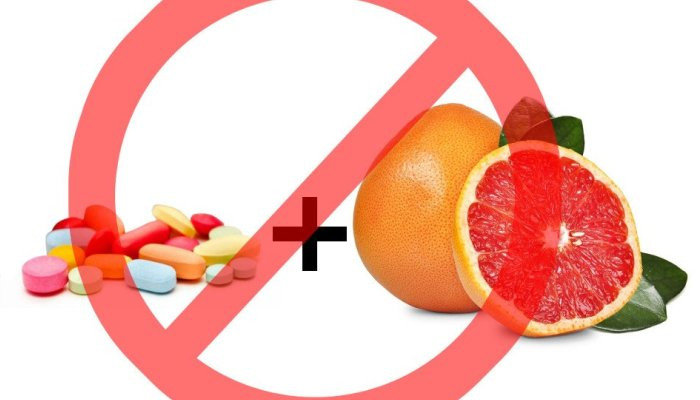Grapefruit–medication interactions: Forbidden fruit or avoidable consequences?
 4596 Sunday, 23 January, 2022, 23:12 While grapefruit is a nutritious fruit, many patients are concerned about the potential for drug interactions with grapefruit juice. Maybe you've receive a medication prescription container with an affixed warning label that recommends you avoid grapefruit or grapefruit juice while taking the medication. Grapefruit juice interactions can even occur with over-the-counter (OTC) drugs. But why is this so important? Interactions with grapefruit can occur with common and important medications - such as those that lower cholesterol, treat high blood pressure, or even those that fight cancer. Why does grapefruit interact with drugs? Grapefruit juice decreases the activity of the cytochrome P450 3A4 (CYP3A4) enzymes that are responsible for breaking down many drugs and toxins. If you drink grapefruit juice, always have your pharmacist run a drug interaction check with your medications to rule out an interaction before you combine them. What side effects are possible? Side effects can range from abnormal heart rhythms, stomach bleeding, muscle pain, muscle breakdown, kidney damage, low blood pressure, difficulty breathing, sedation, and dizziness. Other reactions may occur -- it depends on the drug and the levels of the drug in the blood. If you have been warned about a possible drug interaction with grapefruit, ask your healthcare provider to describe the possible side effect and learn how to recognize it. Can I take my medicine at a different time from grapefruit juice to prevent the interaction? In some cases, you may be able to drink smaller quantities of grapefruit juice, so you should follow the directions on the patient information leaflet for each individual drug or ask your healthcare provider. What other types of juice interact with drugs? You should use caution when eating anything made with the seville orange (often used in marmalades), the pomelo (a citrus fruit with a similar flavor to grapefruit but less tart), and limes. These fruits also contain furanocoumarins and may cause the same interactions as grapefruit. Studies with these fruits are not as frequent, so their risk level is not fully known. Pomegranate juice (from a berry) is a delicious fruit that is full of antioxidants and vitamin C. However, this "superfood" has an interaction with the breast cancer treatment ribociclib (Kisqali), as noted in product labeling. The manufacturer recommends that patients avoid pomegranate or grapefruit and their juices while taking Kisqali. These juices can increase the blood levels of ribociclib, leading to enhanced side effects such as infections, changes in blood cell counts, reduced appetite, nausea and vomiting, diarrhea, hair loss (alopecia), and fatigue. Increasingly, more drugs are being shown to interact with other juices. Aliskiren (brand name: Tekturna) is a renin inhibitor medication used to treat high blood pressure. Research has shown that drinking orange, apple, or grapefruit juices regularly or within a short period before or after a dose of aliskiren can interfere with the absorption of the medication. Blood levels of the drug may decrease, and its blood-pressuring lowering effect may be compromised. You should avoid drinking orange, apple, or grapefruit juice during treatment with aliskiren, unless your doctor advises otherwise. Atenolol, a beta blocker agent also used to treat high blood pressure and angina (chest pain) may have an interaction with orange juice, but the health implications are not really known. Orange juice may block the absorption and lead to lower levels of atenolol in the blood. Patients should avoid consuming large amounts of orange juice to prevent fluctuations in atenolol blood drug levels. Does Allegra interact with orange juice? Talk to your healthcare provider Other resources Additional grapefruit juice drug interactions, and interactions with other juices, can be researched in the Drug Interaction Checker. You can also check your Patient Medication Guide that accompanies your prescription, and your pharmacist may include a label on your bottle warning you of an interaction. |

Zelenskyy reveals updated figures on Ukraine’s losses in war with Russia
29010:54
Washington Post Begins Laying Off More Than 300 Journalists
46400:18
Man sentenced to life in prison for 2024 attempt on Trump's life
463Yesterday, 22:24
Scoop: Plans for Iran nuclear talks are collapsing, U.S. officials say
749Yesterday, 22:13
'You're the worst reporter': Trump unloads on #CNN reporter Kaitlan Collins in clash over Epstein files (video)
518Yesterday, 10:30
U.S. shoots down Iranian Shahed-139 drone that approached USS Abraham Lincoln aircraft carrier. #Reuters
649Yesterday, 09:12
Gaza’s Rafah crossing reopens, first medical evacuees enter Egypt (video)
757Yesterday, 01:29
Iran wants to change venue and format of nuclear talks with U.S.
78003.02.2026, 22:08
